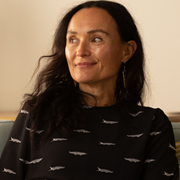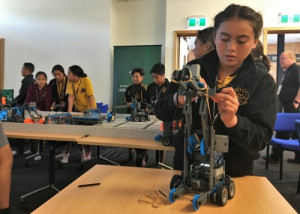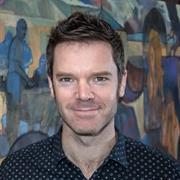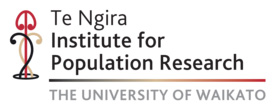Te Ngira's Research Programme
Discover our research.
Te Ngira’s research programme addresses the most central questions of population studies – demographic transitions, population ageing, population distribution, population health and health equity, migration, and ethnic and cultural diversity. It links them to economic, political and social transformations, such as the ageing of the labour force and regional development, to help inform policy-makers and planners at local and national level.
Te Ngira’s research programme comprises four inter-related themes:
Populations

Theme Convenor
 The Māori and Indigenous populations research theme 'Te para one e tū mai nei' is focused on research that both responds to the needs of Māori and iwi communties and develops methodological approaches beyond conventional demography. Drawing on the emerging fields of Indigenous data sovereignty and critical demography, we undertake quantitative and qualitative research that centres Māori worldviews, experiences and aspirations.
The Māori and Indigenous populations research theme 'Te para one e tū mai nei' is focused on research that both responds to the needs of Māori and iwi communties and develops methodological approaches beyond conventional demography. Drawing on the emerging fields of Indigenous data sovereignty and critical demography, we undertake quantitative and qualitative research that centres Māori worldviews, experiences and aspirations.
Projects within this research theme address Māori and Indigenous data sovereignty; Māori fertility; iwi demography; iwi connectedness and civic participation; and the determinants and measurement of Māori wellbeing, with a focus on whānau and child wellbeing. There are strong synergies with the migration theme (Māori-migrant relationships), the health equity theme (tamariki Māori wellbeing), and the population change theme (Māori population size and composition, and the differential implications of regional divergence for mana whenua and mātāwaka).
Image sourced from Ministry of Business, Innovation and Employment and Ministry of Education, https://www.curiousminds.nz/stories/building-robots-from-pieces-to-partnerships/, Crown copyright.
Population Health and Equity

Theme Convenor
 Research within this theme examines trends in wellbeing and mechanisms for advancing health equity. Demographic and epidemiologic analyses underpins research across a broad range of topics including: the broader determinants of population health; health services and their delivery; health and social inequalities; health and wellbeing policy and the research-policy interface; measuring and monitoring whānau ora and wellbeing, particularly through longitudinal and life course epidemiological analyses of the Growing Up in New Zealand study; child health equity in the context of families and communities; disease prevention; health promotion; and wellbeing advocacy.
Research within this theme examines trends in wellbeing and mechanisms for advancing health equity. Demographic and epidemiologic analyses underpins research across a broad range of topics including: the broader determinants of population health; health services and their delivery; health and social inequalities; health and wellbeing policy and the research-policy interface; measuring and monitoring whānau ora and wellbeing, particularly through longitudinal and life course epidemiological analyses of the Growing Up in New Zealand study; child health equity in the context of families and communities; disease prevention; health promotion; and wellbeing advocacy.
Projects within this research theme include explorations of pathways into homelessness and opportunities to sustain healthy, secure and safe housing; a holistic whānau-based intervention to identify and address health determinants in the inpatient paediatric ward; wellbeing capacity building for the support of whānau engaged in the Oranga Tamariki Children's Team; Cook Island wellbeing, research ethics and capacity building; and access to identity as a determinant of wellbeing and health equity.
Population Change

Theme Convenor
 The Population Change research theme concentrates on the sub-national dimensions of demographic , social and economic transformation, the dynamics and implications of which are not uniformly unfolding across the country. Projects will investigate the sequentially unfolding nature of regional shifts from natural population growth to decline; associated work and settlement patterns; the changing patterns and role of urban settlements in Aotearoa/New Zealand's society and economy; changing ethno-demographic composition of national and subnational populations and the special role of Māori within it; and the implications of all these phenomena for land and resource use as well as for the built environment.
The Population Change research theme concentrates on the sub-national dimensions of demographic , social and economic transformation, the dynamics and implications of which are not uniformly unfolding across the country. Projects will investigate the sequentially unfolding nature of regional shifts from natural population growth to decline; associated work and settlement patterns; the changing patterns and role of urban settlements in Aotearoa/New Zealand's society and economy; changing ethno-demographic composition of national and subnational populations and the special role of Māori within it; and the implications of all these phenomena for land and resource use as well as for the built environment.
A key objective of this research theme is to maintain and build on Te Ngira's reputation for providing timely analysis of population change for iwi, local government and community organisations.
Migration

Theme Convenor
 Scholarship within the migration theme seeks to critically explore drivers, patterns, politics and experiences of contemporary migration, with a particular emphasis on the settler colonial context of Aotearoa/New Zealand alongside the South Pacific and Asia-Pacific regions. Our research encompasses both quantitative and qualitative accounts of forced, labour, educational and residential migrations and we place particular emphasis on migrant-centred accounts of Māori-migrant encounters and Indigenous perspectives on migration; the interplay between voluntary and involuntary migration, family processes and health and wellbeing; migration policy and its impacts on social stratification; emotions and migration; and migrant-led diversification, racism and inequality.
Scholarship within the migration theme seeks to critically explore drivers, patterns, politics and experiences of contemporary migration, with a particular emphasis on the settler colonial context of Aotearoa/New Zealand alongside the South Pacific and Asia-Pacific regions. Our research encompasses both quantitative and qualitative accounts of forced, labour, educational and residential migrations and we place particular emphasis on migrant-centred accounts of Māori-migrant encounters and Indigenous perspectives on migration; the interplay between voluntary and involuntary migration, family processes and health and wellbeing; migration policy and its impacts on social stratification; emotions and migration; and migrant-led diversification, racism and inequality.
